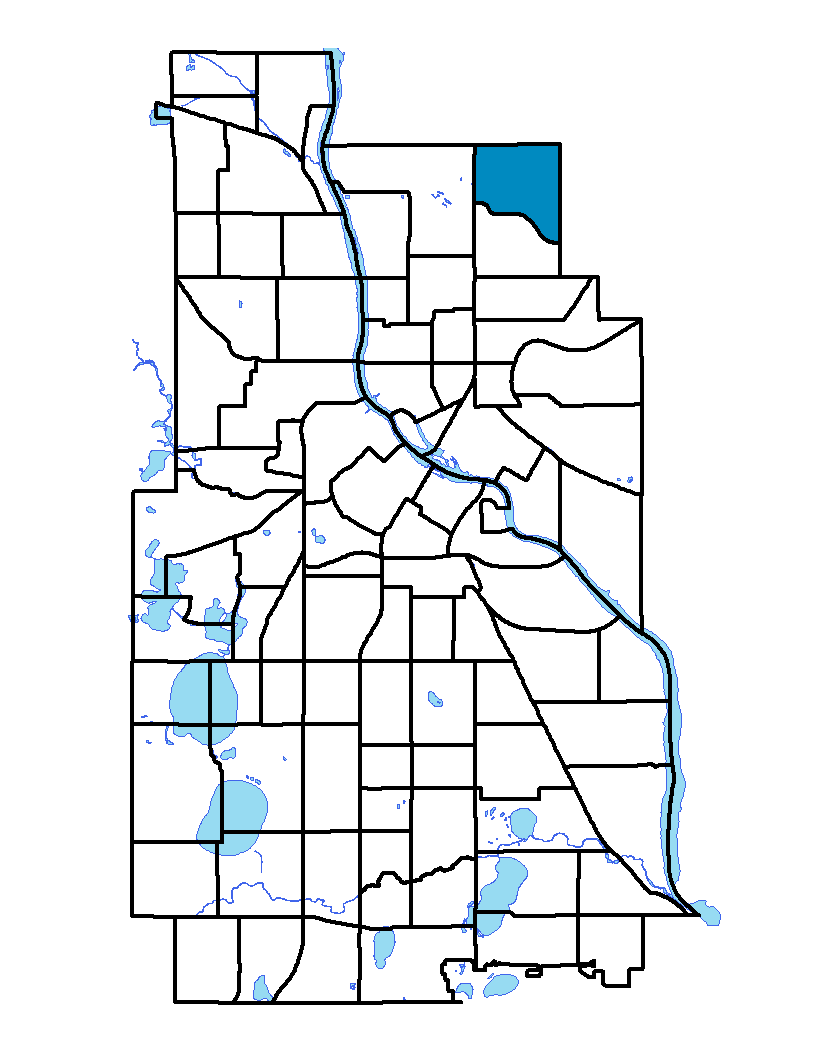Waite Park neighborhood, in the city's northeast corner, is bound on the north by 37th Avenue Northeast, on the east by Stinson Boulevard, on the south by Saint Anthony Parkway and on the west by Central Avenue Northeast. The neighborhood is named for Edward Foote Waite, judge of the District Court of Hennepin County from 1911 to 1941. In 1887, the city incorporated most of the land in the neighborhood. By that time the railroad had built a large repair facility, the Shoreham Yards. The facility is still in use, but the land it's on is expected to be redeveloped. Waite Park is a mainly residential neighborhood.
To learn more about the neighborhood association visit: www.waiteparkneighborhood.org
Indicator Details
| Indicators | Primary Domain | Indicator Value |
Rank |
Tier |
|---|---|---|---|---|
| Walkability | Neighborhood Characteristics | 39 | 75 | Bottom |
| Household Transportation Costs | Transportation | 18.9% | 70 | Bottom |
| Age of Housing | Housing | 94.2% | 66 | Bottom |
| Transit Accessibility | Transportation | 228.8 | 62 | Bottom |
| Offsite Alcohol Outlets | Neighborhood Characteristics | 2 | 61 | Bottom |
| Commute Mode Share | Transportation | 22.6% | 58 | Middle |
| Preschool Enrollment | Educational Opportunities | 40.5% | 56 | Middle |
| Travel Time to Work | Employment Opportunities | 23.1 minutes | 56 | Middle |
| Proximity to Superfund Sites | Environmental Hazards | 33.0% | 53 | Middle |
| Toxic Releases from Facilities | Environmental Hazards | 9.2% | 52 | Middle |
| Access to Parks and Open Space | Natural Areas | 4.8% | 47 | Middle |
| Pedestrian Connectivity | Transportation | 133.6 | 40 | Middle |
| Tree Cover | Natural Areas | 29.1% | 37 | Middle |
| Business Retention | Economic Health | 2.6% | 35 | Middle |
| Adult Educational Attainment | Educational Opportunities | 92.9% | 34 | Middle |
| Voter Participation | Social Cohesion | 29.7% | 31 | Middle |
| Preventable Hospitalizations | Health Systems and Public Safety | 1.8 | 30 | Middle |
| Employment Rate | Employment Opportunities | 71.8% | 28 | Top |
| Excessive Housing Cost Burden | Housing | 24.7% | 28 | Top |
| Access to Mainstream Financial Services | Economic Health | 16.8% | 26 | Top |
| Local Business Vitality | Economic Health | 59.7% | 25 | Top |
| Public Assisted Households | Employment Opportunities | 8.8% | 21 | Top |
| Chronic School Absence | Health Systems and Public Safety | 38.3% | 19 | Top |
| Blood Lead Levels in Children | Housing | 1.7% | 17 | Top |
| Low Birth Weight | Health Systems and Public Safety | 4.4% | 15 | Top |
| Vacancy Rates | Housing | 4.3% | 13 | Top |
| Motor Vehicle Collisions | Health Systems and Public Safety | 1.5 | 12 | Top |
| Reading Proficiency | Educational Opportunities | 50.0% | 11 | Top |
| Food Desert | Neighborhood Characteristics | 50.0% | 11 | Top |
| Long-Term Unemployment | Employment Opportunities | 3.3% | 11 | Top |
| Residential Mobility | Social Cohesion | 89.7% | 8 | Top |
| Violent Crime | Health Systems and Public Safety | 23.6 | 8 | Top |
| Residential Proximity to Traffic | Environmental Hazards | 0.0% | 1 | Top |
| Proximity to Brownfield Sites | Environmental Hazards | 0.0% | 1 | Top |
| School Proximity to Traffic | Environmental Hazards | 0.0% | 1 | Top |
| High School Graduation Rate | Educational Opportunities | -% | - | Data N/A |
| School Readiness Scores | Educational Opportunities | -% | - | Data N/A |

